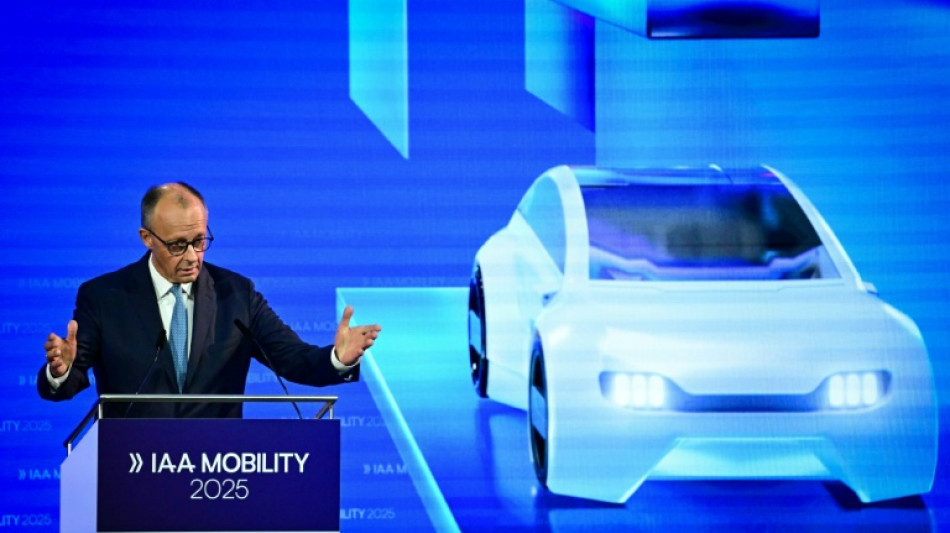
Merz ramps up pressure on EU over electric car shift

German Chancellor Friedrich Merz called Tuesday for "more flexibility" from the EU in the transition to electric cars as resistance grows over plans to phase out combustion-engine vehicle sales by 2035.
Merz made the appeal at the opening of the IAA motor show in Munich, as Europe's struggling automakers line up to plead for the bloc to reconsider the plan aimed at combating climate change.
German titans VW, BMW and Mercedes-Benz as well as US-European giant Stellantis have voiced concerns as they struggle to build up competitive electric vehicles (EV) against Chinese rivals like BYD.
While he did not openly criticise the EU's deadline to halt sales of new combustion engine cars in a decade, Merz said he wanted to see "more flexibilty" in European regulation.
"We are of course committed to the transition to e-mobility," the conservative leader, who took office in May, told the show.
But he added that "we need smart, reliable and flexible European regulation -- it is more necessary than ever".
"We want to achieve climate protection as cost-effectively as possible through technological openness. Unilateral political commitments to specific technologies are fundamentally the wrong economic policy approach."
Markus Soeder, the leader of Bavaria state where the motor show is taking place and a political ally of Merz, was more blunt.
"This combustion engine ban is wrong," he told the show.
"We need other options because, to be perfectly honest, combustion engines still have a future. Electric mobility will prevail in the long term but we need significantly more time to organise the whole thing in Europe."
- 'Supportive' speeches -
Jan Vlasak, who works in software for a German carmaker, praised the speeches as "really supportive of the automotive industry".
The 35-year-old agreed the 2035 ban should be reviewed, calling for it to be pushed back by five to 10 years.
A stuttering shift to EVs is one of the major challenges facing Europe's auto sector. Manufacturers have invested huge sums in the transition, but sales have grown far more slowly than anticipated.
On top of that, the industry has faced rising production costs at home along with fierce competition in China from BYD and other EV makers that has eroded sales for foreign manufacturers in the world's biggest auto market.
In Germany, the auto sector has already shed more than 50,000 jobs over the past year, according to EY.
Volkswagen is planning 35,000 layoffs between now and 2030 and taking the unprecedented step of halting production at two of its sites in Germany.
Plans for redundancies have been coming thick and fast at Porsche, Audi, and at hundreds of German auto sector suppliers.
Merz is planning to host meetings with key auto sector players soon to chart a way forward.
"Our goal is for Germany to remain one of the world's leading places for automotive and manufacturing in the future -- we want to shape the transformation of the automotive industry," he said.
- Chinese competition -
On the other side of the argument, more than 150 businesses in the EV sector wrote an open letter to EU chief Ursula von der Leyen on Monday urging her to "not row back" on the 2035 target.
When the IAA winds down on Friday, carmakers are expected to have a meeting with von der Leyen in Brussels to discuss how to save the sector.
Underlining the competition the German car sector faces, more Chinese carmakers are expected at the fair than ever before.
Fourteen Chinese carmakers -- as opposed to just 10 European ones -- are displaying new models.
Around 100 of the 700 firms taking part overall in the IAA will be from China, up 40 percent from the last show in 2023.
Chinese carmakers there range from BYD, whose sales in Europe rose dramatically in the first half of this year, to GAC, which is taking its first steps in the European market.
BYD on Monday presented its compact Dolphin Surf model, which has been on sale in Europe since May for around 20,000 euros ($23,500).
From later this year it will be produced in a new facility in Hungary, with the company hoping to avoid EU tariffs on Chinese imports.
Volkswagen is trying to fight back with its own models at the more affordable end of the market.
L.Johnson--TNT